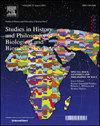A Ordem do Universo no Séc. XII: Harmonia e Epistemologia na Tradição Neoplatónica
IF 0.9
4区 哲学
Q1 Arts and Humanities
Studies in History and Philosophy of Science Part C-Studies in History and Philosophy of Biological and Biomedical Sciences
Pub Date : 2022-12-31
DOI:10.17990/axistudies/2022_05
引用次数: 0
Abstract
This research aims to understand the order of the universe in the twelfth century. With this purpose, we pretend to study the period known as medieval renaissance proposing a possible contribution of the platonism, examining what it offered in terms of a new epistemology of the universe (universitas), and its law of harmony. The argumentation is supported on the cosmology of the Timaeus, which provided a rational Christian theology — the theology of “measure, number and weight” — as well as a mathematical and proportional view of the cosmos. Nonetheless, this intellectual reading overlaps with mystical speculations which are supported by the doctrines of Pseudo-Dionysius, in his analogies between the Creation and the Trinity. Meanwhile, the demand of divine brands in the order of universe provides a link between microcosm and macrocosm which will benefit analogies between the Church, Christ-Man and the Universe, with a consequent valoration of the human dignity. Indeed, combining mystic and rationality, the twelfth century neoplatonism consists in timaic and dionysian ideals that unfolds a new epistemology of the universe.19世纪宇宙的秩序。十二:新柏拉图传统中的和谐与认识论
这项研究旨在了解12世纪的宇宙秩序。出于这个目的,我们假装研究中世纪文艺复兴时期,提出柏拉图主义的可能贡献,研究它在宇宙(universitas)的新认识论方面提供了什么,以及它的和谐法则。蒂迈乌斯的宇宙论支持了这一论证,它提供了一种理性的基督教神学——“测量、数量和重量”的神学——以及一种数学和比例的宇宙观。尽管如此,这种理智的阅读与伪狄奥尼修斯的学说所支持的神秘主义推测重叠,他将创造与三位一体进行了类比。同时,宇宙秩序中神圣烙印的要求提供了微观世界与宏观世界之间的联系,这将有利于教会、基督-人与宇宙之间的类比,从而使人的尊严得到珍视。事实上,十二世纪的新柏拉图主义结合了神秘主义和理性主义,包含了浪漫主义和酒神主义的理想,展现了一种新的宇宙认识论。
本文章由计算机程序翻译,如有差异,请以英文原文为准。
求助全文
约1分钟内获得全文
求助全文
来源期刊

自引率
0.00%
发文量
1
期刊介绍:
Studies in History and Philosophy of Biological and Biomedical Sciences is devoted to historical, sociological, philosophical and ethical aspects of the life and environmental sciences, of the sciences of mind and behaviour, and of the medical and biomedical sciences and technologies.
Contributions are from a wide range of countries and cultural traditions; we encourage both specialist articles, and articles combining historical, philosophical, and sociological approaches; and we favour works of interest to scientists and medics as well as to specialists in the history, philosophy and sociology of the sciences.
 求助内容:
求助内容: 应助结果提醒方式:
应助结果提醒方式:


